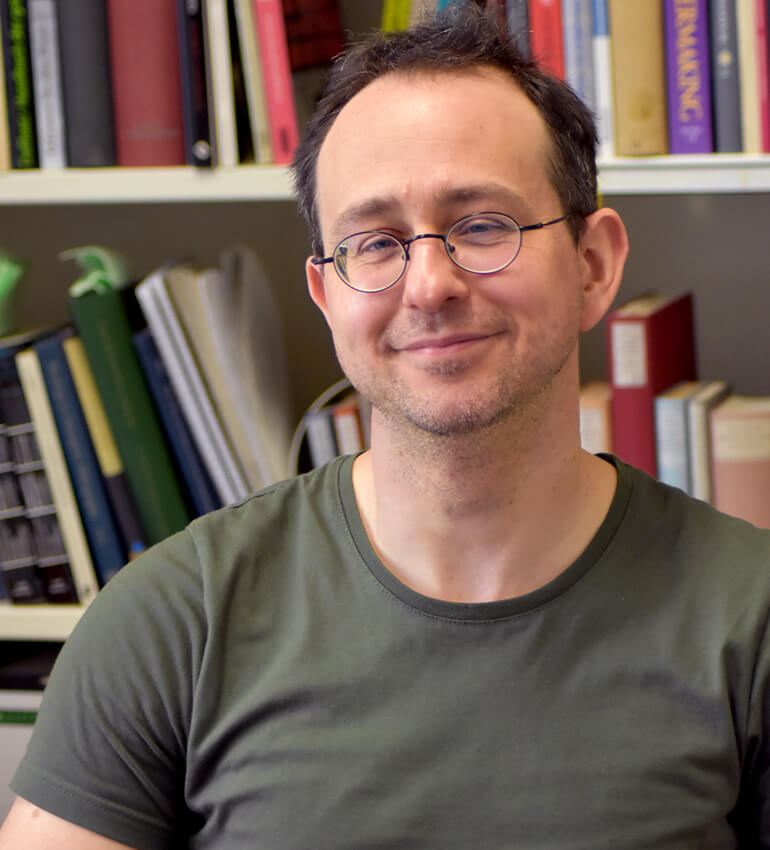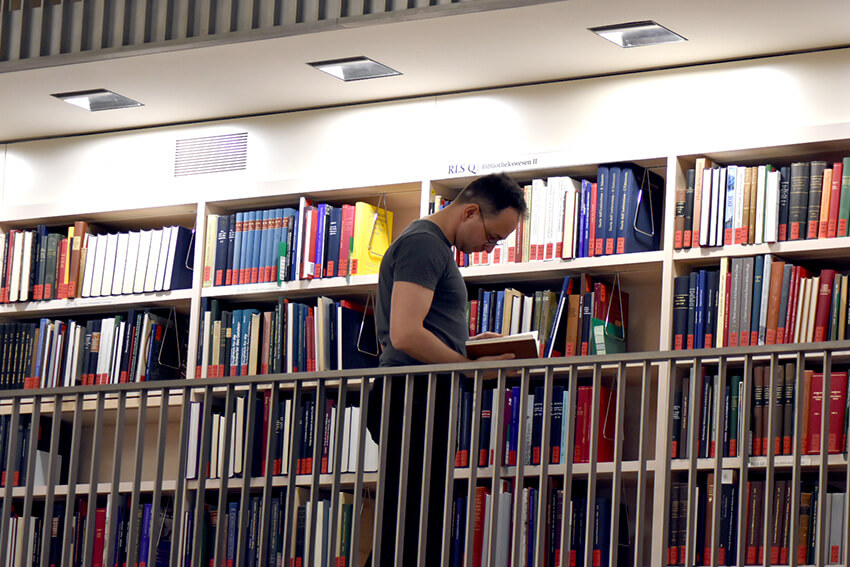Stefan Duhr, MA – Department of Manuscripts and Historical Prints in the Berlin State Library
Professional background & career.
I decided to work in the library at the end of school during my Abitur phase (1998/99).
Career advice from the employment office was helpful. During the application phase for training to become a skilled worker, I realized that I would rather study. The choice between the Potsdam University of Applied Sciences and the Institute for Library Science at the Humboldt University in Berlin fell on the latter because I wanted to study history as a second subject alongside library science. Already during the first internship I realized that formal indexing, i.e. recording formal characteristics (author, title, scope, publication information, etc.) of books and other media in a database, was my thing. During the following internships, I worked in this area again and again.
My master's thesis deals with how free church seminar libraries in the GDR obtained Western literature. At the end of my studies, I helped in one of these libraries as part of a fee-based job to record the literature acquired during the GDR period in the electronic catalog.
After a certain waiting period, I was able to work as a freelance retrospective cataloguer in the historical library of the German Historical Institute in Rome for four years following my studies.
There I had my first encounter with old prints. These are prints from the 16th to 19th centuries that were printed on a hand press. My project manager at the time arranged for me to receive appropriate training at the Bavarian Library School (today: Bavarian Library Academy) in Munich. Through my own efforts during a librarian day, I also attended a training course in Hamburg for cataloging in the Common Library Association (GBV).
Both helped me to move to the Berlin State Library in 2012 for the project for the indexing and digitization of German prints of the 18th century (VD18).
Today I work in their manuscripts and historical prints department and represent my library in the relevant specialist committees.
Find out more about the Berlin State Library here.
Photo credit for featured image Stefan Duhr: © Stefan Duhr
Personal experiences.
I particularly value the opportunity to contribute through my work to enabling people to educate themselves and conduct research.
I do this by helping you find the right media (in my case almost exclusively books) through an optimal description in the catalog. Working with old prints offers the opportunity to go into more detail, bypassing the mass operation of modern media. In addition to the formal ones, we also record specimen-specific features such as provenance, and sometimes also bindings and papers.
A special concern for me is the description of print variants as part of the formal development. This provides research important information on the text genesis in the preparation of editions. I already got the idea during my work for the VD18, because when comparing our specimens with the digitized specimens of other libraries, I always noticed differences. In this respect, it was a stroke of luck that I was able to deepen this topic while incorporating a collection of prints by the French writer of the Enlightenment Voltaire. The result is the further training "finger printing process and signature formula as a means of distinguishing print variants" (more information) , which I offer not only at Stibi Berlin, but also in other libraries, including 2023 at the Bavarian Library Academy in Munich, which includes a circle.
I am particularly satisfied with having used the time during the Corona pandemic to translate the STCN fingerprint rules, which were previously only available in Dutch and English, into German in my home office together with an expert committee of which I am a member ( More information) .
Using this process, print variants can be better differentiated. Another product of this time is the in-depth German-language description of the recommendations for collating old prints, which were previously only available in English to this extent, by the American bibliographer Fredson Bowers using a collational formula. Collation refers to the description of the sheets of a book block bound in layers.
Meaning & added value.
What is particularly meaningful to me is the previously mentioned supporting function for education and research. Working in the Stabi Berlin's Rare Reading Room as part of borrowing and using offers direct contact with readers, who sometimes ask me questions about a specific topic or book. In addition, there are inquiries that are forwarded to me via my department's information desk. For example, one time it was about determining the bibliographic format of an old print. Unlike the layout format, which is based on the height of the spine of the book, this involves folding the printed sheet, which requires a lot more knowledge and is therefore also part of my previously mentioned training.
Stabi Berlin offers its users, among other things, the knowledge workshop service, where knowledge and skills for scientific work are imparted. Due to my involvement with print variants, I am offering an online workshop on text and image comparison software tools.
Recommendations.
If you have a certain sense of order, are open to old and new media and are interested in collecting, processing and communicating information, you are well qualified to work in the library.
In addition, there is a willingness to educate yourself and to help others with their research. Working in a library is also less influenced by commercial aspects.
If you are interested in this, you should consider getting to know the professional field of libraries through an internship. In general, I recommend completing as many internships as possible during your studies, also in order to make contacts with potential employers and benefit from the experiences of those who are already working there.
It is important to me that students acquire the practical knowledge, especially during internships, that will help them to have the courage to enter professional life in a later application process. With the profile line Historical Holdings in its master's degree program in Library and Information Science, the HTWK Leipzig offers a good prerequisite for subsequently being able to work with old prints. I see institutions like the Berlin State Library, with their large collection of historical prints, as having a special responsibility to enable young people to enter professional life in this area.
I have already brought the topic of recruiting young talent to the committee responsible for the K10plus association catalog and sought discussions with the HTWK Leipzig and the book studies course at the University of Mainz. As many colleagues will be retiring in the coming years, this topic is becoming increasingly important.
Another important aspect is the further training of colleagues who already work with old prints. I have made relevant information available to everyone on the wiki page of the responsible K10plus committee that I manage (more information) .
Developments & future prospects.
Even if digital media already make up a large proportion of new acquisitions, the mediating activities of libraries will not lose importance. Their non-commercial focus on education and research is particularly important.
The indexing of old prints will also continue to be important.
The current trend in this area is provenance development. However, I am confident that formal indexing will continue to provide basic and in-depth metadata. Some tasks will not be able to be solved automatically in the foreseeable future. Other aspects, such as the binding index and the paper identification as well as the description of the typography and the book decoration, could become more important. At the moment, many things are only possible to a limited extent due to the limited personnel capacities in this area.
I particularly value the opportunity to contribute through my work to enabling people to educate themselves and conduct research.







